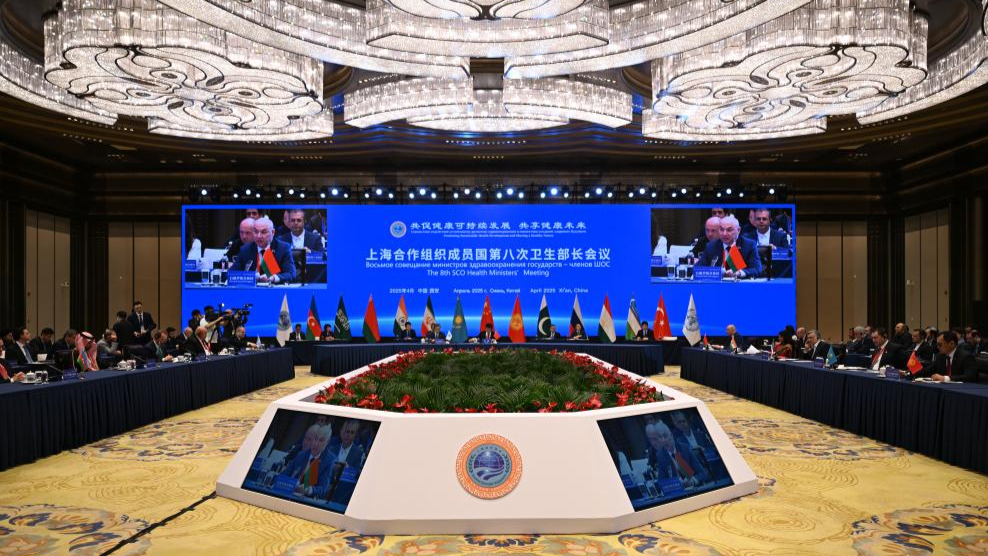
Chinese Vice-Premier Liu Guozhong on Monday called on the member states of the Shanghai Cooperation Organization (SCO) to strengthen practical cooperation and boost openness and innovation in the health sector.
He made the remarks during his address at the opening ceremony of the eighth SCO Health Ministers' Meeting in Xi'an, Shaanxi province.
Liu, also a member of the Political Bureau of the Communist Party of China Central Committee, said the health sector is an important area for SCO cooperation, and fruitful outcomes have been achieved in safeguarding public health security, deepening exchanges on disease prevention and control technologies, advancing medical science and technology cooperation, and promoting the preservation, innovation and development of traditional medicine.
READ MORE: SCO political parties meet to discuss development of cooperation mechanism
He emphasized that relevant parties should focus on practical cooperation to jointly promote the development of the health sector and drive progress in medical science and technology through openness and innovation.
He also highlighted the significance of strengthening people-to-people exchanges and upholding multilateralism.
During the meeting, senior health ministers from SCO states also called for deeper convergence of digital technologies and medicine to expand equal access to healthcare and empower research innovation.
Lei Haichao, minister of China's National Health Commission, proposed leveraging novel information technologies and the SCO hospital alliance to establish remote medical cooperation platforms and network and ramp up development of digital health.
He also advised establishing an SCO innovation center for the integration of medicine and engineering. The center will be based at the First Affiliated Hospital of Xi'an Jiaotong University in Xi'an.
"Through building joint R&D platforms and training centers, we aim to enhance original drug development capabilities and innovation capacities of SCO member states, while fostering cross-border and interdisciplinary collaboration in medical-engineering integration," he said.
Punya Salila Srivastava, secretary of Ministry of Health and Family Welfare of India, said India has striven to use digital health to narrow the gap between communities in healthcare services, with an emphasis on boosting access in remote and less developed regions.
The nation's robust digital ecosystem has enabled the launch of a universal immunization platform designed to register and track vaccination records of mothers and infants and underpin the development of innovative tools for managing mental health diseases and tuberculosis.
"These efforts resonate with the SCO's shared objective of strengthening healthcare delivery systems to the last mile," she said.
Syed Mustafa Kamal, federal minister of the Ministry of National Health Services, Regulations and Coordination in Pakistan, said the global expansion of Information and Communication Technology has created unprecedented opportunities to improve healthcare accessibility, efficiency and quality.
"For the SCO, collaborative advancements in digital health present a strategic opportunity to strengthen health systems across member states," he said.
He called for the setup of a SCO digital health task force dedicated into harmonizing policies on data security, interoperability and ethical use of artificial intelligence (AI).
He also proposed launching a SCO digital health knowledge hub to facilitate the exchange of useful practices and develop guidelines for transparent and responsible use of AI in healthcare.
In addition to digital health, discussions of the meeting encompassed emergency medicine, traditional medicine and primary healthcare.
READ MORE: Secretary-general: SCO prioritizes WTO-centric trade, counters unilateralism
Lei, China's health minister, said that 90.8 percent of households in China can reach the nearest medical facility within 15 minutes and primary-level healthcare institutions now account for over 50 percent of total medical visits.
"In 2024, the nation's average life expectancy reached 79 years, ranking high among upper-middle-income countries," he said. "The infant mortality rate dropped to four per 1,000 live births and the maternal mortality rate fell to 14.3 per 100,000, marking the best levels in history."
Lei called for strengthening communication and cooperation in primary healthcare to help member states to explore and devise tailored approaches to expand universal healthcare coverage, upgrade allocation of healthcare resources and improve efficiency of medical services.
Xinhua contributed to the story.


